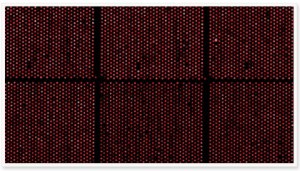DNA Arrays

While the phases are quickly completed when substrates and probe materials are in common usage, array projects using a unique substrates or probe types are readily completed using this step-by-step methodology.
The process consists of 5 primary phases :
- Project Concept and Definition
- Assay and Microarray Design
- Experimental Pilot Projects
- Pre-Production Arrays for Testing
- Full Production
I- Project Concept and Definition
- Project scope
o specific requirements and format for results
o limits for signal:noise ratios
- Physical array attributes
o substrate size and composition
o # of probes, controls and replicates
- Probe material physical characteristics and source(s) identified
- # of probes, controls and replicates
- Other client-specific requirements
II- Assay and Microarray Design
- Detailed plan of assay and microarray design
o physical layout of probes, controls, and replicates on the microarray surface
o substrates and attachment chemistries identified for testing
o QC requirements established
- Hybridization protocol established
III- Experimental pilot project(s)
- Test arrays printed offering alternatives for identified areas of variability
- Pilot arrays tested by MI for quality and basic array parameters
- Client testing of pilot arrays for compliance with assay requirements
- Review of pilot results with client
- Adjustments to array composition
- Determination of 'ready-to-produce' or, when needed, creation of a follow up pilot experiment
IV- Pre-Production arrays for testing
- Decision made for production of a full array lot based on pilot results
- QC requirements finalized
- Manufacturing SOPs generated
- Arrays supplied to customer for full-use testing to evaluate assay performance
V- Full Production
- Final client approval to begin production
- Annual volumes and call-off requirements determined
- Periodic reviews scheduled

